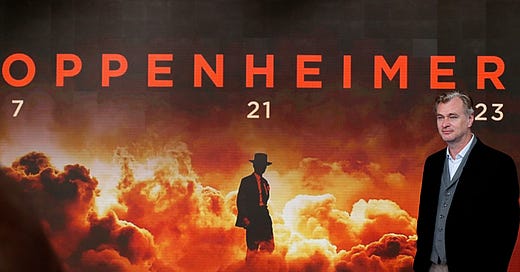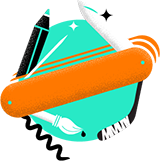Christopher Nolan Reads "Without Purpose"
I would argue, though, that the purpose is finding a purpose
A few years ago, I read an excellent interview that psychologist Adam Grant (who has a Substack) conducted with director Christopher Nolan.
At one point, Grant asked Nolan how he finds something that he’s passionate about. Nolan responded, in part:
“For me, it's all about trying new things. If you're going to write, you want to read a lot before you write, without any purpose. I love watching TV, love watching movies, preferably with no sense of purpose. Just being open to things that might inspire you—and staying open.”
Nolan reads “without any purpose.” I would argue, though, that there is a purpose in that: to find something that stimulates you but that you couldn’t have known to look for. I often wander bookstores, which I think of as places to find interests that I didn’t know I had.
That Grant/Nolan interview came back to mind last week as I watched Tara Hitchcock interview Nolan about the new blockbuster film Oppenheimer, which Nolan wrote and directed. Hitchcock starts by asking Nolan whether it’s true that “this whole thing started when Robert Pattinson gave you a book of speeches.” Here’s how Nolan responds:
“Yeah, Rob, off the back of [the film] Tenet, where we refer to Oppenheimer, and I wrote a thing about this incredible moment that Oppenheimer and the scientists of the Manhattan Project had where they could not completely eliminate the possibility that when they triggered that first gadget, that first atomic device, they might start a chain reaction that would destroy the world. And we used that as a metaphor for Tenet, which Rob was in. As a wrap gift he gave me a book of Oppenheimer’s speeches from the 1950s, where you’re reading these great intellects trying to deal with the massive consequences of the way in which they’ve changed life forever for all of us. And I really got hooked on the story.”
Sounds like what might have started as one of his forays into reading without purpose turned into some pretty hefty purpose.
I think one of the most important, and difficult, challenges of work — if not of life in general — is striking a balance between focusing your attention on what’s right in front of you and remaining open to new possibilities. I also think it becomes pretty easy, especially as we get settled in routines, to let the oppenness1 part of that balance slip silently away.
So maybe take a cue from the director, and embrace some practice that brings new ideas into your orbit, even if there’s no apparent purpose…yet.
Thanks for reading, and I hope this newsletter can be part of your practice of reading without clear purpose in search of new thoughts. (I very purposely ignored the repeated — and probably sound — advice I got when starting a newsletter to make sure that readers would know what to expect from one post to the next.)
If you’re interested in the balance between mining knowledge you already have for value and exploring for new ideas, Adam Alter’s new book, Anatomy of a Breakthrough, delves into the so-called “explore/exploit tradeoff.” He and I touched on the general topic in a previous post.
If you have a particular practice for stretching your long antennas out into the world to catch new ideas, let me know in the comments below. One of my practices is to read (or listen to) small parts of tons of books. I avail myself of several free ebook samples a day, and find a lot of value in perusing them.
As always, if you liked this post, please share it.
And if you aren’t subscribed, you can do that here.
Next post, back to a Q&A!
David
This Oppenheimer-on-the-brain typo was too apt to correct.







I’m advanced in years but still working as a management consultant. I am agog at the works of fiction, long reads and podcasts I didn’t have time to consume. Now that I do, my work is much more informed by the “humanities “ , more grounded in the frailty of being human in the world of work and far more tilted towards social justice than ROI.
Wish corporate me had known what I know now: ROI is a far more complex calculation than it’s current iteration
Excellent!
I have two practices that help. The first is tithing my time to the (often crazy) projects of friends. It's a diverse bunch and over the years I've learned things I didn't realized existed - from film animation to building blood glucose monitors to the fluid dynamics of beach volleyballs and so on.
The other practice is to drop in on talks far removed from my field. The imposter syndrome often crops up, but I've come to recognize it as an invitation to learn.